

KiwiCo - Home.
Raven Johnson McGraw Hill Biology. Germ Wars - The story of kids as heroes in preventing germs. 325ch04. Science Standards MN 2009 005263. Density equation. Grade-6-Physical-EnergyinEarthSystems-Complete. 6th - Physical Science - Energy. ES student ebook. Setting up experiments. Science Humor. Chemguide: helping you to understand Chemistry - Main Menu. Molecule of the Month. Welcome to the Molecule of the Month page!
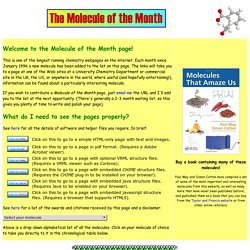
This is one of the longest running chemistry webpages on the internet. Each month since January 1996 a new molecule has been added to the list on this page. The links will take you to a page at one of the Web sites at a University Chemistry Department or commercial site in the UK, the US, or anywhere in the world, where useful (and hopefully entertaining!) , information can be found about a particularly interesting molecule. If you wish to contribute a Molecule of the Month page, just email me the URL and I'll add you to the list at the next opportunity. What do I need to see the pages properly? See here for all the details of software and helper files you require.
See here for a list of the awards and citations received by this page and a disclaimer. Above is a drop-down alphabetical list of all the molecules. Buy a book containing many of these molecules! Crash Course Kids. Cards: 7: Cell Parts and their Functions. PenMerah [dot] com. Academic Language - Science. Academic language is the language used in instruction, textbooks and exams.
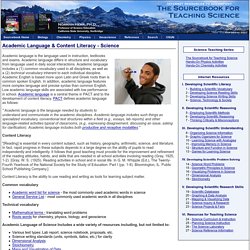
Academic language differs in structure and vocabulary from language used in daily social interactions. Academic language includes a (1) common vocabulary used in all disciplines, as well as a (2) technical vocabulary inherent to each individual discipline. Academic English is based more upon Latin and Greek roots than is common spoken English. In addition, academic language features more complex language and precise syntax than common English. Low academic language skills are associated with low performance in school. Science Interactive Simulations. Environment - Teaching CLIL. Greenhouse Effect and Solid Waste.
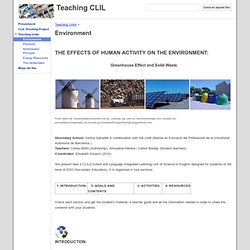
Fotos tretes de: sustainableprocurement.net.au, unescap.org, xtec.es, ahorroenenergia.com, ecodiari.cat, psm-pollenca.balearweb.net,boemre.gov/mmskids/Energy/SavingEnergyatHome.htm. Secondary School: Institut Sabadell in collaboration with the UAB (Màster en Formació del Professorat de la Universitat Autònoma de Barcelona ).Teachers: Carles Moltó (Authorship), Almudena Herrera i Carlos Bardají (Student teachers).Coordinator: Elisabeth Eixarch (2010). We present here a CLIL(Content and Language Integrated Learning) unit of Science in English designed for students of 3rd level of ESO (Secondary Education).
It is organized in four sections: Check each section and get the student's material, a teacher guide and all the information needed in order to share the contents with your students. This unit is designed for 3rd of ESO students in Catalonia. The Unit is developed in ten sessions of fifty minutes, each one with a specific purpose. ClassTools.net.
Misconceptions of Science. Science, Technology, Engineering and Math: Education for Global Leadership. Index by Year and Subject. Sixth Grade Science Vocabulary. Sixth grade science can be a challenging subject, since most study of middle school science at this level requires much concentration and effort.
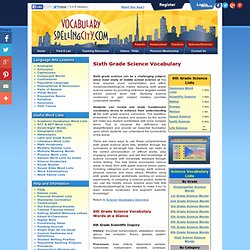
VocabularySpellingCity makes studying sixth grade science easier by providing extensive targeted middle school science word lists. Studying science vocabulary to gain subject mastery provides undeniable benefits. Students can review and study troublesome vocabulary terms to enhance their understanding of the sixth grade science curriculum. The repetition embedded in the practice and quizzes for the words will make any student comfortable with more complex terms. This is because the definitions are straightforward and provide an essential foundation upon which students can understand the connectivity of the words.
There are many ways to use these comprehensive sixth grade science word lists, whether through the summaries or full-length lists. Ecology.
Gases. STEM. Dissection. Electricity. Genetics. Cellular Science. Measurements. States of Matter. Waves. Periotic table / elements. The Nature of Science and the Scientific Method. Carbon Dating. Science of Water. Mode, Mean, Median, & Range. Space. Genetics. Other's Science Research. ActiveScience. 10 Reasons That Just May Convince Anyone That Science Is Awesome. Home - Radiolab. 20+ Science Activities for Kids that are Perfect for Spring.
Three Little Pigs Construction Company. Chapter 4, Ethics in the Science Classroom. Case Studies The teaching of ethics is particularly suited to the use of illustrative case studies.
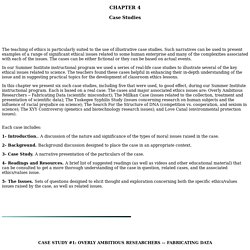
Such narratives can be used to present examples of a range of significant ethical issues related to some human enterprise and many of the complexities associated with each of the issues. The cases can be either fictional or they can be based on actual events. In our Summer Institute instructional program we used a series of real-life case studies to illustrate several of the key ethical issues related to science. The teachers found these cases helpful in enhancing their in-depth understanding of the issue and in suggesting practical topics for the development of classroom ethics lessons. In this chapter we present six such case studies, including five that were used, to good effect, during our Summer Institute instructional program.